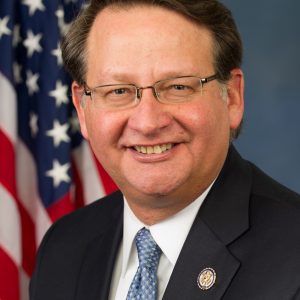Speakers
Gary Peters
Elected in 2014, Senator Gary Peters represents the State of Michigan in the U.S. Senate. Senator Peters serves on the Senate Armed Services Committee, Senate Commerce, Science, and Transportation Committee, the Senate Homeland Security and Governmental Affairs Committee and the Joint Economic Committee.
Brett Walton
Brett writes about agriculture, energy, infrastructure, and the politics and economics of water in the United States for Circle of Blue. Brett also writes the Federal Water Tap, Circle of Blue’s weekly digest of U.S. government water news. He is the winner of two Society of Environmental Journalists reporting awards, one of the top honors in American environmental journalism: first place for explanatory reporting for a series on septic system pollution in the United States (2016) and third place for beat reporting in a small market (2014).
Brett Walton: Last week, you helped convene a Senate subcommittee hearing on the federal lull in responding to perfluoronated chemicals, also known as PFAS. Based on that hearing, what do you feel is Congress’s role in this?
Sen. Gary Peters: Well I think there’s a number of things that we have to do. First and foremost, we need to put more money into research. One thing that came out very clear, in the hearing, was that we still don’t know a whole lot about the human health affects about this class of chemicals and we’re talking about 3,500 different type of PFAS chemicals. We need to have increased research dollars. In fact, part of what came out of the hearing, which I think was a surprise to some folks, is that the impact of the human body may not be limited to the folks who are drinking water with PFAS in it. There also maybe a pathway through the air, or even in skin contact, and certainly that’s very concerning, given the fact that PFAS is put on upholsteries and clothing and other ways that people may have contact with it, so certainly there’s a need for additional research.
But the other fact that I think is absolutely critical, is the EPA has no enforceable standard and I pushed them pretty hard in that committee that we’ve got to have the standard. Folks need to know what is a safe level, if any, and what standards do we have to clean up to. I was reassured by the EPA that they thought they’d have something this fall. But they’ve been saying that for some time. They’ve always been kicking the can down the road and we’re going to keep pushing that.
And I think the third area, certainly, is where accountability can be tied to federal properties, particularly the Department of Defense. A number of military facilities have this type of contamination as a result of their fire-fighting foam and so there will be contamination related to that and we’re going to have costs associated with that cleanup.
But I’ve also, in the short-run, have been working to try to limit the amount of PFAS that’s going into the environment. In fact, in the FAA Reauthorization we’re going to be taking up this week, in the Senate, I’ve got language in there that will allow civilian airports to use alternatives to PFAS in their fire-fighting foam, this reducing the amount going into our environment.
Brett Walton: The EPA is preparing a PFAS Management Plan that’s expected to be released by the end of the year. What do you hope to see in that plan?
Gary Peters: Well I hope, first off, we can get an enforceable standard so that we can hold folks accountable for this type of contamination. Not just federal government properties, Department of Defense, etc, but also private industry. No, this is not contamination that’s confined to federal properties, although that certainly contributes to it. But we have a lot of lakes throughout Michigan.
Brett Walton: When you say enforceable standards, meaning what?
Gary Peters: Well, meaning that there’s a standard to cleanup and if you can find accountability for someone, that they’re the ones responsible for the PFAS, that they would then be required to start mitigation strategies, as well as cleanup.
Brett Walton: And then are you interested in, or think it’s necessary to have a drinking water standard from the EPA?
Gary Peters: Oh yes, absolutely. Absolutely. So that’s part of what we’ll be continuing to push for.
Brett Walton: And if the EPA decides not to act, is that something that Congress should consider requiring?
Gary Peters: Yes. Yeah, definitely. There’s no question this is critically important. I think PFAS, this can very well be a situation very similar to lead and other things and products that have been widely used and were widely used throughout many, many years people have been exposed to. This is something that we need to be addressing nationally. This is not a Michigan issue. This is a national issue. In fact, at our hearing, I had my two colleagues from New Hampshire there who were very concerned. Very high levels of PFAS contamination in many parts of New Hampshire, as well, so this is a national problem that requires my colleagues throughout the Senate and the House to be engaged in. This is a national problem that requires my colleagues throughout the Senate and the House to be engaged in.
Brett Walton: What information do you feel like you need to know, that you don’t know, that you need to take additional next steps?
Gary Peters: Well part of it is back to the health-related information, you know, the National Institute of Health, they don’t really, fully, understand how all this works and it may also be difficult to know if there are any kinds of safe levels. It depends on the kind of research.
Gary Peters: I did secure some additional funding through the NDAA, which is our National Defense Authorization for increased research into these chemicals, but that’s not an easy task given the fact that this class has 3,500 chemicals associated with it. But it certainly leads to a number of questions as to how we are creating these chemicals without background testing to understand what impact they may have on the human body. Eventually, they get released into the environment. Now with new technologies coming on board, we’re likely to see even newer compounds coming out at an accelerated rate. So I think this raises a host of questions, not just related to PFAS, but generally, the manufacturer of new chemicals and whether or not they pose a potential human risk.
Brett Walton: And lastly, the EPA has said that it will hold a community meeting in Michigan later this week to discuss PFAS chemicals. They’ve held similar meetings in other states around the country. Do you have any additional information about that meeting that you can share with us?
Gary Peters: We are in the process of working with them right now, as far as working out the details and we’ll have that information shortly.
Brett Walton: The meeting is on October 4th and 5th, correct?
Gary Peters: That’s correct. That’s what I have as the dates. But as far as a more individualized detail, my staff has been in communication with them and we’re still developing … We’re still finding out exactly what they have in mind and pushing them to make sure that they give every opportunity possible for individuals to be able to express their concerns about this.
Brett Walton: All right. Thank you, Senator Peters.
Gary Peters: Great to be with you. Thank you so much.





